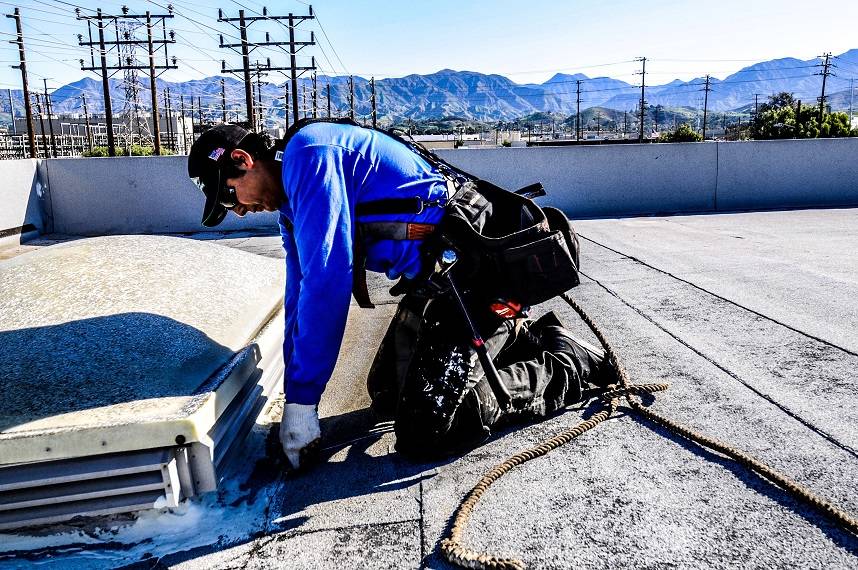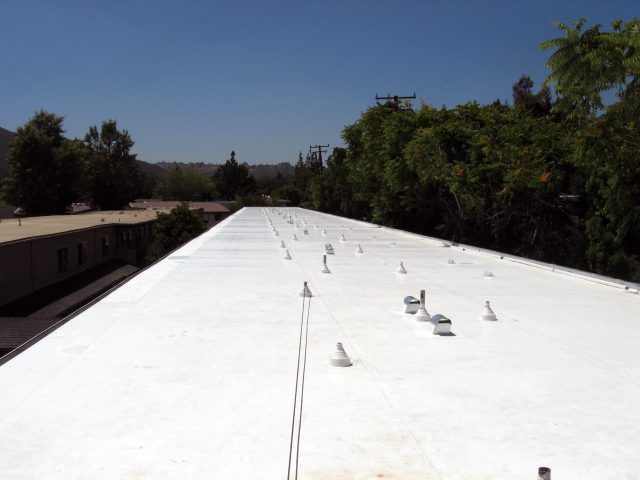Schedule Free Estimate
9 Good & Bad Things You Need To Know About PVC Roofing – Your Honest Guide
You’re a facilities manager or building owner and your commercial roof leaks ALL THE TIME. You finally decide that it’s time to get a new roof on your commercial building. So you start getting quotes from roofing companies in California, and one commercial roofing system keeps coming up; PVC Roofing System.
You don’t know anything about commercial roofing let alone this roofing system and it’s a huge investment for your company, so what do you do? Well, fear not I’m here to help make your roofing decision a little easier. Here are the 9 Pros And Cons Of PVC Roofing Systems.
What is a PVC Roofing System?
PVC or polyvinyl chloride membrane roofing is a single-ply material that is primarily used on commercial flat roofs. It has been a popular option for commercial buildings for over 50 years and continues to be chosen above all other options. To create a hardwearing and durable roof it is normally placed on either side of polyester to heighten support and help to improve the flexibility of the roof during bad weather conditions.
1. Strong (PRO)
One of the main benefits of PVC membrane roofing is its strength. It has been specifically engineered for this purpose and designed to last upwards of two decades. This also allows it to have a
minimum breaking strength of 200lbs/inch, however, this has been known to be higher.
2. Weather Resistant (PRO)
It is welded using hot air. This gives it an impermeable bond and one that is watertight. In addition, these seams mean that they can withstand the pressure from ponding, reducing
the risk of damage with bad drainage. The flexibility of PVC allows it to move in strong weather conditions and reduces the risk of cracks. There is evidence to suggest that some PVC roofs have been able to withstand hurricanes not that we have hurricanes in Los Angeles or Orange County where Central Roofing is based, but nevertheless, they can hold up.
3. Chemical Resistant (PRO)
PVC has good resistance to a range of chemicals. This makes it ideal for commercial buildings that exhaust fumes out of their roof. It can also withstand extended exposure to animal
fat.
4. Fire Resistant (PRO)
This type of roof has been known to self-extinguish themselves once a fire has been put out. They are slow-burning, improving their safety for busy commercial settings.
5. Mold Resistant (PRO)
The durable nature of PVC welded roofs makes them resistant to mold, bacteria, and plant roots alike.
6. Friendly to the environment (PRO)
PVC is highly efficient at cooling and heating. A PVC commercial roof has a reflective surface which reduces wasted energy and helps to mitigate heat build-up in cities.
7. Costly installation (CON)
In order for a PVC roof to be laid, it requires a clean and flat surface. In some situations, the old roof has to be entirely removed. This incurs additional labor costs and requires specialist installation for the best results.
8. Can be difficult to repair (CON)
Older PVC roofs were constructed differently from the ones we have now which makes them difficult to repair.
9. Not suitable for foot traffic in low conditions (CON)
Extreme cold can increase the risk of the roof shattering and experiencing puncture damage. This also makes it unsuitable for high foot traffic, specifically if you live in a region
where the temperature regularly plummets.
CONCLUSION
A PVC roofing system is one of the most commonly used plastics out there. It can be made into various products with distinct performance characteristics, including roofs. Here in SoCal Los Angeles and Orange County Roofers choose this material mostly because of its superior durability.
You can count on a PVC roof to protect your building, even under harsh climates and weather conditions.
This roofing system is made from two layers of PVC roof material with polyester sandwiched between the layers to act as a reinforcement. For added flexibility and strength against ultraviolet rays, the layers in a PVC roof come with additives.
Moreover, you can add an additional layer of acrylic or silicone coating to the membrane, turning your roof into a commercial cool roof! Even better is that you may qualify for a rebate by doing so. PVC is a great commercial roofing system but it’s not for everyone. Between Modified Bitumen, TPO it’s the most expensive option. Additionally, check out our video on commercial roofing systems.
What's the life expectancy?
30+ Years
Can I turn a PVC roof into a cool roof?
YES! Absolutely and both acrylic and silicone roof coatings go well with a PVC roofing membrane.
How are they installed?
Fully Adhered, Mechanical or Self Adhesive.
[simple-author-box]
Central Roofing Company Headquarters
555 W. 182nd Street
Gardena, CA 90248
310-527-6770

Get A Quote
One of our roofing estimators will gladly meet you to discuss your options and follow up with a free, no-obligation, written estimate.
At Central Roofing Company, we understand that a sturdy and reliable roof is crucial for the success and safety of your commercial property. Our team of highly skilled and trained roofing professionals is committed to delivering exceptional craftsmanship and superior service in every project we undertake.
555 W. 182nd St. Gardena, CA 90248
Ph: 310-527-6770
Our Office Locations:
Our Services
CA license #684960 – Central Roofing, 2024 ©All Rights Reserved | Terms of Use | Privacy Policy | Built by Dymic
